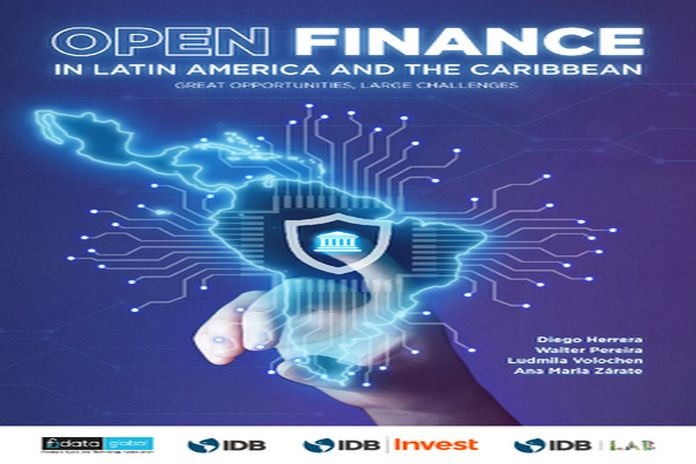- IDB and FDATA launch new study, Open Finance in Latin America and the Caribbean: Great Opportunities, Large Challenges
- Publication provides comprehensive overview of the current state of open finance in Latin America and the Caribbean and potential benefits for increasing financial inclusion
LATIN AMERICA / THE CARIBBEAN – Open finance can contribute to increasing financial inclusion in Latin America and the Caribbean through the consented use of financial consumer data to offer specific financial products and services. The financial service industry and authorities should improve regulation and build institutional capacity to reap the benefits from the concept, according to a new study by the Inter-American Development Bank (IDB) and the Financial Data and Technology Association (FDATA).
Open finance is a financial services ecosystem where consumers consciously consent for their transactional data to be shared between financial institutions. This allows institutions to offer tailor-made services and products. Among the potential benefits of open finance are increased competition, greater financial inclusion, and reduced entry barriers for consumers.
According to the World Bank’s Global Findex 2021 Database, 27 percent of adults in Latin America and the Caribbean do not have access to financial services, and the share of adults borrowing from a financial institution is 30 percent, below the average for OECD member countries. Moreover, according to the International Finance Corporation, the financing gap for micro, small and medium-sized enterprises (MSMEs) in the region is 35 percent of the regional gross domestic product. In this context, open finance would help advance financial inclusion by reducing entry barriers for consumers and promoting greater convenience and accessibility to tailor-made products and services, including digital payments, credit, investment, and insurance.
Open finance environments are still in the early stages in Latin America and the Caribbean. Only five countries in the region – Brazil, Chile, Colombia, Ecuador and Mexico – have regulations in this area or are implementing them, according to the study, which was launched today at the 4th FintechLAC Network meeting in Washington, DC.
Implementing public policies to promote open finance beyond these five countries remains an opportunity in the region. Four out of five regulators and supervisors expressed interest in having structured regulatory frameworks for open finance in their respective jurisdictions, according to the study. Three out of five said they are interested in technical standardization for third-party providers (TPP) and application programming interfaces (API), among other technologies for implementing open finance.
The report states that improving institutional capacity is critical to advancing open finance frameworks. This can be done by creating a regulatory and institutional framework, training human talent and increasing technological capacity. Close coordination and dialogue between the private and public sectors, transparent communication among the actors involved, and financial literacy are also essential.
“Implementing an open finance ecosystem is complex and requires regulations and rules to operate for the benefit of financial consumers. Appropriate regulatory frameworks can contribute to organizing financial authorities, creating public-private alliances for implementation, and handing power over data to financial consumers. We are confident that open finance will allow financial institutions to obtain better conditions for accessing and using financial products with security and efficiency,” said Susana Cordeiro Guerra, manager of the institutions for development sector at the IDB.
The study also shows the financial sector’s perspective. Ninety percent of banking associations surveyed see open finance as an enabler of better personalization of financial products and more competition among financial players. Entrants, such as open-finance-specialized fintech companies, offer various products, including connectivity layers for banks, data aggregation, or payment initiation.
“Appropriate regulation is critical for the delivery and healthy evolution of these new financial ecosystems that, by design, should improve the financial well-being of the end consumer and support innovation in an ethical and compliant competitive landscape. Empowering products and services that unleash the inherent benefits of open finance also need clear rules and guidelines that afford protections around access to, and use of, consumer-owned data,” said Richard Prior, chief executive officer of FDATA Global.
The publication provides an overview of the open finance industry on the global stage, public policy and state-of-the-art solutions for this promising financial innovation. It can be used by industry, policymakers, academia and the public in Latin America and the Caribbean for various purposes, from understanding the basics of the ecosystem to implementing policy recommendations.





